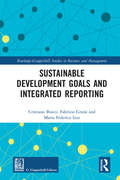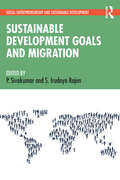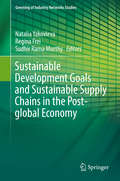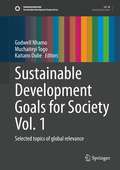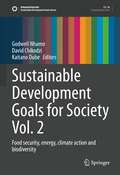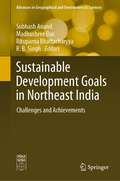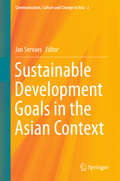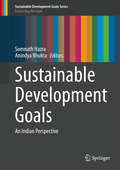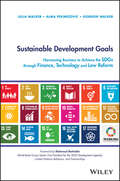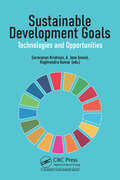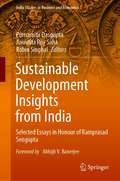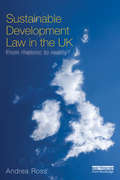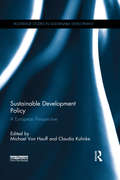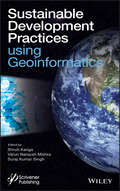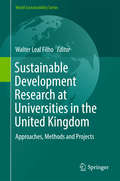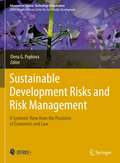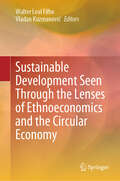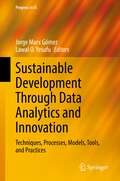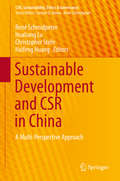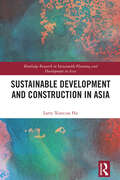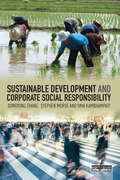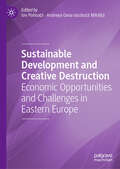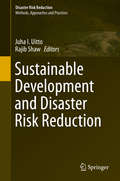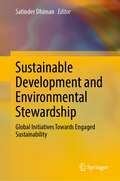- Table View
- List View
Sustainable Development Goals and Integrated Reporting (Routledge-Giappichelli Studies in Business and Management)
by Cristiano Busco Fabrizio Granà Maria Federica IzzoOur planet faces massive economic, social, and environmental challenges. To deal with these challenges, the United Nations has promoted 17 Sustainable Development Goals (SDGs) to define global priorities and aspirations for 2030, and Governments worldwide have already agreed on these goals. In order to approach them practically, private and public organizations have to contribute to make SDGs happen by identifying and executing sustainable strategies as key drivers of their visions and business models. Building on the emerging concept of Integrated Thinking (IT), this book explores how modern organizations can leverage a long-term integrated strategy to reconcile financial stability with social and environmental sustainability and create enduring value for all stakeholders. By focusing on the value-creating role of business organizations in delivering on the promise of sustainable and inclusive development, the book enriches the debate on Integrated Thinking and Integrated Reporting (IR), with particular emphasis on the value creation process. This book offers an opportunity to discuss the way in which business organisations can rethink their management processes, accounting tools and reporting solutions, as they strive for both competitiveness and growth while contributing to the achievement of the SDGs, and long-term value creation more broadly. Based on the analysis of different case studies, the book explores how organizations are approaching these challenges and how they are connecting SDGs, to business models and strategies. Analysing the impact of SDGs on materiality, connectivity, and stakeholder engagement, this book provides an insight into how Integrated Thinking, Management and Reporting is currently practiced and in which way these managerial innovations can contribute to SDGs.
Sustainable Development Goals and Migration (Towards Sustainable Futures)
by P. Sivakumar S. Irudaya RajanThis book looks at migration in contemporary society and its interrelations with development. It presents the complexities and dilemmas associated with migration, the changes in theoretical and historical perspectives on migration and development, and the role of policies and the sustainable development goals in this context. The volume views migration as a phenomenon for advancing human development outcomes. It deals with wide-ranging issues including labour migration, the idea of decent work, migration and transnationalism, remittances, social networks and capital, and addressing poverty. The chapters highlight the focus of the Sustainable Development Goals (SDGs) and its relevance on migrant rights, safeguarding livelihoods and health. They also offer insights into regional and international co-operation on policies for migration, social growth and protection, and citizenship. With comparative analyses of data, trends and development indicators as well as various case studies, this volume examines the impact of migration on international relations and politics, labour market outcomes, gender, youth and education among others. It also discusses the loss of lives and livelihoods due to the Covid-19 pandemic, its impact on migration and the effects of the pandemic on the contemporary discussions on migration and SDGs. Rich in empirical data, this book will be an excellent read for scholars and researchers of migration and diaspora studies, development studies, refugee studies, public policy and governance, international relations, political studies, political economy, sociology and South Asian Studies.
Sustainable Development Goals and Sustainable Supply Chains in the Post-global Economy (Greening of Industry Networks Studies #7)
by Natalia Yakovleva Regina Frei Sudhir Rama MurthyThis book presents a collection of studies on current best practices for delivering sustainable development policies within supply chains. It critiques the limitations of existing business theory and practice on sustainable supply chain management, and discusses opportunities for new conceptual models for businesses to engage with Sustainable Development Goals (SDGs). It examines how businesses can work towards implementing Sustainable Development Goals in the contexts of entrepreneurial initiative, industry collaboration and regional development. SDGs renew the sustainable development agenda for global communities and ask businesses and organisations to reset their sustainable development policies. A strategy to embed sustainable development principles into business operations along the supply chain operations, which has been a conceptual and, in many instances, practitioner, business and industry achievement of the past decades, is not enough to shift the economic and social conditions of poor populations around the world. How would the global supply chains of the future look like? What social relations does it envisage? How will businesses and organisations engage with societies, environments and complex institutional contexts in emerging markets and developing countries, which are faced with issues of population growth, needed leaps in infrastructure provision, educational and health improvements, cultural and institutional shifts? The books challenges current approaches to sustainable supply chain practices guided by discussion on SDGs. It reviews implementation issues of existing sustainable development approaches, assesses the advancement of sustainable development strategies and examines the opportunities for global value chains to increase their positive social and environmental inputs in regions, communities and organisations. The book collects both conceptual and empirical studies set in a variety of business and organisational contexts, such as manufacturing, retail, procurement, cities and industrial parks. It contests the accepted axioms of sustainable practices in the global supply chains and proposes new models for organisations and production networks to engage with societies and address market and production effects on communities and institutions.
Sustainable Development Goals for Society Vol. 1: Selected topics of global relevance (Sustainable Development Goals Series)
by Godwell Nhamo Kaitano Dube Muchaiteyi TogoWritten by 43 authors from Africa, Europe and Latin America, this book presents 19 topics addressing poverty in the context of Sustainable Development Goals (SDGs), leadership in implementing SDGs, and SDGs in service delivery and local government. As the world has gone past five years of implementing the 2030 Agenda for Sustainable Development and the intertwined 17 SDGs, new opportunities in research continue to open up. Hence, documenting some of the initiatives put in place around the world regarding the implementation of the SDGs is one of the aims of this publication. With 10 years remaining, the book further enhances the desire to scale up SDGs implementation. The selection of case studies from the selected regions also provides a balance in terms of how the SDGs are being rolled out for economic growth, environmental stewardship and social protection. The ambition remains even with the challenge brought by the COVID-19 pandemic that preoccupied the whole of 2020; spilling over to 2021. There is no doubt that resources have been diverted, but the world must stay on the course to 2030 and beyond. Therefore, the book is relevant for several stakeholders including the academics, development partners, government officials and other individuals that are involved in making sure no one is left behind in the lead to 2030.
Sustainable Development Goals for Society Vol. 2: Food security, energy, climate action and biodiversity (Sustainable Development Goals Series)
by Godwell Nhamo Kaitano Dube David ChikodziThis book profiles various cases that are emerging in addressing global challenges in the context of SDGs for society in the era of climate change and covers case studies of projects being undertaken to tackle biodiversity, food security, climate change, energy and water security. The book is written by 37 authors, and will appeal to various stakeholders including academics working within the identified thematic areas, policy planners, development agencies, governments and United Nations agencies. The adoption of the Sustainable Development Goals (SDGs) in 2015 ushered a new era in the global development agenda as the world transitioned from the Millennium Development Goals (MDGs). The new era of SDGs that are all-inclusive, unlike the MDGs with the focus now being on ensuring human success that is predicated on environmental protection. The year 2020 marked five years post the adoption of the SDGs with increased calls for stock-taking of progress made amid strong calls for a decade of action to accelerate the delivery of the SDGs by 2030. These calls have been louder now given the impact of the COVID-19 pandemic, which reset the global economy and increased intensity of extreme weather events across the world. Since climate change has emerged as one of the biggest threats to the achievement of the SDGs, there has been growing concerns on its impact on biodiversity loss and the extinction of some species. There are also concerns regarding increased food insecurity at the household level in some parts of the world, particularly in Asia and Africa. With the demand for climate change action on the increase, there have also been growing calls for the big carbon emitters to drastically cut their emissions and invest in clean energy to save the planet by following development pathways making emissions stay under the 1.5°C increase in temperature.
Sustainable Development Goals in Northeast India: Challenges and Achievements (Advances in Geographical and Environmental Sciences)
by R. B. Singh Subhash Anand Rituparna Bhattacharyya Madhushree DasThis book covers themes related to the geosphere, biosphere, sociosphere and ecosphere dealing with changing geographical, environmental and socio-economic realities to plan a sustainable future for the northeast region (NER) of India. The NER consists of eight states—Assam, Arunachal Pradesh, Tripura, Nagaland, Manipur, Mizoram, Meghalaya and Sikkim—and they carry political, economic and social importance. The book integrates the past, present and future of geospheric attributes incorporating progress towards the Sustainable Development Goals (SDGs) to meet the demands for improving human wellbeing under diverse and challenging socio-economic, political and environmental conditions. The key SDGs, as in food and agriculture, health, education, water, energy and other overarching goals of the region, have yet to incorporate providing sustainable jobs and promoting equality and inclusive development, although there have been a few studies in that regard.The challenges to achieve SDGs in the NER are formidable compared to the rest of India. The NER has put a great deal of effort into achieving the SDGs, mainly in poverty (SDG-1), good health (SDG-3), education (SDG-4), gender (SDG-5), decent work (SDG-8) and reduced inequalities (SDG-10), similar to the rest of the country. However, the standard development indicators such as road length, access to health care, power consumption and other measures are far below the national average. A multi-pronged strategy has played a pivotal role in the region, but development strategy to attain the SDGs 2030 must be more inclusive in empowering people with maximising self-governance, considering the resources, needs and aspirations of the people.This book evaluates the performance of the SDGs and fills in the gaps. It includes case studies focusing on different SDGs using advanced cartographic, statistical and GIS techniques and methods. It also provides unique findings that serve as valuable resources for planners and policy-makers so that a sustainable future in Northeast India can be achieved.
Sustainable Development Goals in the Asian Context
by Jan ServaesThis book presents research that focuses on Sustainable Development in Asia. Chapters are extended works of papers presented at Communication/Culture and The Sustainable Development Goals (CCSDG): Challenges for a New Generation, an international conference held in Chiang Mai University in December 2015. The chapters address assessments of Millennium Development Goals in several Asian countries and the region as a whole. The book also identifies and discusses the changes and potential improvements in the transition from Millennium Development Goals (2000-2015) to Sustainable Development Goals (2015-2030). Areas that are covered in the book, which are illustrated with case studies, include Corporate Social Accountability, Information and Communications Technologies, and Small Medium Enterprises (SMEs). The book serves as a useful resource for academics, scholars, students, and policymakers, interested in Development Studies.
Sustainable Development Goals: An Indian Perspective (Sustainable Development Goals Series)
by Somnath Hazra Anindya BhuktaThis volume examines the practicality of achieving the UN Sustainable Development Goals in India, and includes policy analyses and statistical assessments of comparative data between India and different countries. With a focus on poverty and economics, the contributors offer sector and state specific performance analyses of each goal, determining the feasibility for different states and regions to implement a given goal under conditions of extreme poverty and economic distress. Readers will learn how to perform comprehensive economic performance analyses, and how to apply these methods at local and regional scales within the framework of sustainable development. The book will be of interest to students and researchers studying sustainable development, economics, and policy analysis, as well as NGOs and government agencies working towards achieving the SDGs in impoverished nations.
Sustainable Development Goals: Harnessing Business to Achieve the SDGs through Finance, Technology and Law Reform
by Gordon Walker Julia Walker Alma PekmezovicAchieving the Sustainable Development Goals through Finance, Technology and Law Reform Achieving the SDGs requires a fundamental rethink from businesses and governments across the globe. To make the ambitious goals a reality, trillions of dollars need to be harnessed to mobilise finance and accelerate progress towards the SDGs. Bringing together leaders from the World Bank, the financial and business sectors, the startup community and academia, this important, topically relevant volume explains what the SDGs are, how they came about and how they can be accelerated. Real-world case studies and authoritative insights address how to direct investment of existing financial resources and re-align the global financial system to reflect the SDGs. In depth chapters discuss how financial institutions, such as UBS Wealth Management, Manulife Asset Management and Moody’s Rating Agency are supporting the SDGs. The opportunities arising from Blockchain, Big Data, Digital Identity and cutting-edge FinTech and RegTech applications are explored, whilst the relevance of sustainable and transparent global supply chains is underscored. Significant attention is paid to law reform which can accelerate progress of the SDGs through SME Financing, Crowdfunding, Peer-to-Peer Lending and tax restructuring. To achieve the ‘World We Want’, much needs to be done. The recommendations contained within this book are critical for supporting a fundamental shift in thinking from business and governments around the world, and for building a more just and prosperous future for all.
Sustainable Development Goals: Technologies and Opportunities
by Raghvendra Kumar Saravanan Krishnan A. Jose AnandSustainable Development Goals (SDGs) are goals set by the United Nations to address the global challenges and foster sustainable development and harmony. To effectively achieve these goals, leveraging advanced technologies and engineering techniques is paramount. This edited volume explores the pivotal role of technology and engineering in advancing the SDGs across various sectors such as green energy, water management, healthcare, agriculture, and smart manufacturing. From innovative solutions in clean energy production to precision agriculture and smart cities, technological advancements offer scalable and efficient approaches to tackle complex sustainability issues.
Sustainable Development Insights from India: Selected Essays in Honour of Ramprasad Sengupta (India Studies in Business and Economics)
by Purnamita Dasgupta Anindita Roy Saha Robin SinghalThis volume is a collection of essays that provide a comprehensive coverage of multiple aspects of the discourse on environment, development and sustainability. It is designed to bring in a host of perspectives highlighting the synergies and the trade-offs in this debate, showcasing research along with policy implications of putting research into use.The global discussion on sustainability paints the broad canvas for this book. This volume aims to probe some contemporary issues that will help in understanding the sustainability narrative in India. The topics span over a host of questions on energy, environment, natural resources and related constituents of development. The discourse further extends to the role of economic modelling, public policy debates, political intervention, stakeholders’ response, community participation and so on. The discussions are often based on empirical support, review of existing literature as well as policy analysis. With an ultimate aim to understand the overall development narrative of the people of India, the discourse takes in its ambit the nuances of resource utilisation, economic growth, COVID-19 impacts, competitiveness and market structures, urbanization, sectoral reforms, environmental hazards, climate change, pollution, natural resource accounting and management to name a few.The book is divided into four sections, namely, The Big Picture: Evolving Perspectives; The Energy Scenario: Dilemmas and Opportunities; Sustainability Cross-Cuts: Developmental Aspects and Externality Empirics: Knowledge and Practice. The first section contains commentaries on the overarching themes of economic growth, development and sustainability. It presents some emerging perspectives on the developmental crisis that has emerged through the environmental lens with additional focus on the need for inclusion of creativity, knowhow, technology and financial resources to achieve the ambitious SDG targets. The second section brings out the dilemmas and opportunities in the energy sector, that has been a key player in discussions of sustainability, especially for India where significant technological advances in conventional forms of energy supply coexists with fairly low levels of per capita energy consumption and energy security is a key challenge. The section on sustainability crosscuts attempts to highlight the problems and processes of mainstreaming the sustainability question into conventional thinking through the concepts of a circular economy, green accounting techniques, institutional and governance structures, public policy and inclusive growth, amongst others. The last section presents some empirical studies on environmental externalities, the unaccounted environmental effects of economic production and consumption and finally the behavioural aspects of the stakeholders that are crucial in the larger narrative of sustainable development.This edited volume contains contributions of reputed scholars from various Indian universities, research institutions and professionals from outside academia, who are proven experts in their fields. The link between policy, practice, and well-being of the large vulnerable population of India is the major focus of enquiry that will help researchers, practitioners and policy planners in conducting further research in energy, environment, resource and linked areas of development economics. General readers with an active interest in energy, environment, and economic development are also likely to find this book an interesting read, especially in the times of several environmental challenges facing humankind.
Sustainable Development Law in the UK: From Rhetoric to Reality?
by Andrea RossSustainable development is now widely accepted as a political objective in the UK and elsewhere but to what extent has the UK’s rhetoric on sustainable development become a reality? The aim of this book is to critically examine the UK’s approach to promoting and delivering sustainable development. It begins by providing a detailed account of UK law on sustainable development by reviewing the various policy, institutional and legal mechanisms used by the UK since the 1980s and by devolved administrations since devolution took effect in 1999. Progress has been slow, too slow and, according to the scientists, time is running out. To deal with this lack of progress, the book advocates increasing the status of ecological sustainability and sustainable development through the introduction of a wide range of legal mechanisms which would compel the change needed. The book calls for ecological sustainability, or respecting the Earth’s environmental limits, to be afforded the status of legal principle and argues that with ecological sustainability at its normative core, sustainable development could provide an effective framework for decision making and governance. It argues that to support this approach and ensure consistency, the time has come for sustainable development to receive explicit legal backing. Over and above its symbolic and educational value, legislation can impose mandatory rules on policymakers and decision makers, often with meaningful consequences both inside and outside the courtroom. To this end, the book contributes to the theory on sustainable development governance by suggesting three possible legislative approaches for such intervention. The volume concludes that while a lack of leadership on sustainable development may hinder the introduction of these innovations, once introduced, these innovations would equally provide much needed support for effective leadership towards a sustainable future. Andrea Ross is a Reader in the School of Law at the University of Dundee and has taught and researched in the areas of public and environmental law for over 18 years. Before becoming an academic she qualified as a Barrister and Solicitor in Ontario, Canada.An Earthscan from Routledge book.
Sustainable Development Policy: A European Perspective (Routledge Studies in Sustainable Development)
by Michael Von Hauff Claudia KuhnkeSustainable Development Policy: A European Perspective uses a variety of multidisciplinary perspectives to explore the ways in which sustainable infrastructures can play a more prominent and effective role in international development policy. Building on a solid introduction to sustainability and development policy, this book discusses ways in which viable reform can be promoted through coherent governing, the design of social security systems, education systems and the possibilities of fair trade as an alternative trading concept . Sustainable Development Policy generates a platform on which to encourage constructive dialogue on issues surrounding sustainability in the wake of the global scarcity of natural and economic resources. This edited collection will be of great interest to all students and lecturers of development studies and development policy, as well as researchers from other disciplines looking for an introduction to sustainable development policy and its practical applications.
Sustainable Development Practices Using Geoinformatics
by Shruti Kanga Varun Narayan Mishra Suraj Kumar SinghOver the last few years, the stress on natural resources has increased enormously due to anthropogenic activities especially through urbanization and industrialization processes. Sustainable development while protecting the Earth’s environment involves the best possible management of natural resources, subject to the availability of reliable, accurate and timely information on regional and global scales. There is an increasing demand for an interdisciplinary approach and sound knowledge on each specific resource, as well as on the ecological and socio-economic perspectives related to their use. Geoinformatics, including Remote Sensing (RS), Geographical Information System (GIS), and Global Positioning System (GPS), is a groundbreaking and advanced technology for acquiring information required for natural resource management and addressing the concerns related to sustainable development. It offers a powerful and proficient tool for mapping, monitoring, modeling, and management of natural resources. There is, however, a lack of studies in understanding the core science and research elements of geoinformatics, as well as larger issues of scaling to use geoinformatics in sustainable development and management practices of natural resources. There is also a fundamental gap between the theoretical concepts and the operational use of these advance techniques. “Sustainable Development Practices Using Geoinformatics” written by well-known academicians, experts and researchers provides answers to these problems, offering the engineer, scientist, or student the most thorough, comprehensive, and practical coverage of this subject available today, a must-have for any library.
Sustainable Development Report 2022
by Jeffrey Sachs Christian Kroll Guillame Lafortune Grayson Fuller Finn WoelmThe Sustainable Development Report 2022 features the SDG Index and Dashboards, the first and widely used tool to assess country performance on the Agenda 2030 and the Sustainable Development Goals. In a context of multiple crises, the report analyzes and outlines how the SDGs can be used as a roadmap for more sustainable societies by 2030 and beyond. In particular, this year's edition underlines the importance of international financing mechanisms for addressing lack of fiscal space in poorer countries and promoting sustainable investments into physical and human infrastructure. The authors examine country performance on the SDGs for 193 countries using a wide array of indicators, and calculate future trajectories, presenting a number of best practices to achieve the historic Agenda 2030. The views expressed in this report do not reflect the views of any organization, agency or program of the United Nations. This title is available as Open Access on Cambridge Core.
Sustainable Development Research at Universities in the United Kingdom
by Walter Leal FilhoThis book gathers inputs from a variety of researchers in the field of sustainable development in the widest sense across the UK, from business and economics, to arts and fashion, administration, environment and media studies. The book also describes research, curriculum innovation, and campus greening in a comprehensive way. Many universities in the United Kingdom are currently engaged in high-quality research on matters related to sustainable development. Yet there are relatively few publications that provide a multidisciplinary overview of these efforts and projects, and in which researchers from across the spectrum of the natural and social sciences have the opportunity to present their research methods, the results of their empirical research, or exchange ideas about on-going and future research initiatives focusing on sustainable development. Addressing this important gap in the literature, this book contributes to the further development of this rapidly growing field in the United Kingdom and beyond.
Sustainable Development Risks and Risk Management: A Systemic View from the Positions of Economics and Law (Advances in Science, Technology & Innovation)
by Elena G. PopkovaThis book is devoted to a systemic study of socio-economic development risks arising in the Decade of Action, as well as the prospects for risk management in support of sustainable development. It aims to overcome fragmentary consideration of risks in the existing literature through their comprehensive coverage and the establishment of their interconnections from the perspective of sustainable development.The novelty of this book is that it provides a comprehensive accounting of socio-economic development risks in the Decade of Action, as well as a rethinking of these risks from a sustainable development perspective. The book also opens up the possibility of the most comprehensive and effective risk management in support of sustainable development. The practical relevance of the book stems from the fact that it describes and discusses practical experience in detail and accompanies the theoretical material with numerous case studies, including cases and frameworks with extensive coverage of international best practices.The book is intended for scholars, for whom the book forms a systemic scientific view of the risks of socio-economic development arising in the Decade of Action, as well as the prospects for risk management in support of sustainable development. The book is also of interest to practitioners, for whom it offers practical advice on risk management at all levels of the economy for sustainable development. Many examples from different countries make the book attractive to a wide international audience. The book is of particular interest to readers from Russia.
Sustainable Development Seen Through the Lenses of Ethnoeconomics and the Circular Economy
by Walter Leal Filho Vladan KuzmanovićThis book introduces ethnoeconomics, explaining how cultural, social, and historical factors influence economic behavior and decision-making. The book also delves into the principles of the circular economy, emphasizing the importance of designing out waste, keeping products and materials in use, and regenerating natural systems. It explores how these principles can contribute to sustainable economic growth and resilience. The book also explores how insights from ethnoeconomics can inform and enhance the implementation of circular economy principles, with case studies and theoretical frameworks that showcase the benefits of this integration for sustainable development.
Sustainable Development Through Data Analytics and Innovation: Techniques, Processes, Models, Tools, and Practices (Progress in IS)
by Jorge Marx Gómez Lawal O. YesufuSustainable development is based on the idea that societies should advance without compromising their future development requirements. This book explores how the application of data analytics and digital technologies can ensure that development changes are executed on the basis of factual data and information. It addresses how innovations that rely on digital technologies can support sustainable development across all sectors and all social, economic, and environmental aspects and help us achieve the Sustainable Development Goals (SDGs). The book also highlights techniques, processes, models, tools, and practices used to achieve sustainable development through data analysis. The various topics covered in this book are critically evaluated, not only theoretically, but also from an application perspective. It will be of interest to researchers and students, especially those in the fields of applied data analytics, business intelligence and knowledge management.
Sustainable Development and CSR in China
by René Schmidpeter Hualiang Lu Christopher Stehr Haifeng HuangThis book offers an in-depth analysis of Corporate Social Responsibility, gathering contributions by authors from various countries, cultures and political systems. It provides readers with a better understanding of the concept and its implementation in China by pursuing an international approach. The respective contributions examine Corporate Social Responsibility in terms of its close ties to ecology, corporate sustainability and the future of specific industries. The book is the product of two international meetings, the "Ecological Education and Sustainable Development Forum" in Chengdu, China, and the "CSR & Business Sustainability Development Forum" in Shenzen, China.
Sustainable Development and Construction in Asia (Routledge Research in Sustainable Planning and Development in Asia)
by Larry Xiancun HuThis book illuminates fundamental knowledge and provides a comprehensive guide for those seeking to understand the intricacies of sustainable development and construction in Asia. Each chapter is dedicated to a specific aspect of sustainable construction, offering in-depth analysis, case studies, and practical insights.The main characteristic of this book is a comprehensive exploration and integration of research, practices, and innovations, emphasizing the importance of academic research and practical implementations in driving sustainable construction. The advanced project management methods towards sustainable construction are explained, including life cycle management, sustainable procurement, risk management, lean construction, and integrated project delivery. Smart construction technologies are illustrated, for example, 3D printing, BIM (building information modelling), industrialized, prefabricated, and digital technologies like eXtended reality, machine learning, digital twins, big data, blockchain, Internet of Things, and cloud construction technologies. Particularly, the relationships and differences among off-site, industrialized, prefabricated, modular, panelized, and hybrid construction are displayed. Finally, practical on-site construction techniques and valuable sustainable construction materials are demonstrated in shaping sustainable practices.This book will be of interest to practitioners, researchers, and consultants in the general field of sustainable development in construction.
Sustainable Development and Corporate Social Responsibility
by Stephen Morse Dongyong Zhang Uma KambhampatiCorporate Social Responsibility (CSR) has become an important concept in the last few decades. Although it originated in the developed countries of the West, the concept has been embraced and adapted by corporations and policy-making agencies in many developing countries. Not surprisingly, given the importance of growth and development as policy objectives in these countries, CSR has had a significant impact on sustainable development. Sustainable Development and Corporate Social Responsibility explores the evolution of CSR across the developed and developing world, with a particular focus on China and sustainable development. Through an extensive review of the literature and relevant case studies, the book examines whether CSR can make a contribution to sustainable development, how the patterns of CSR in developed Western economies compare to that in the rapidly growing economy of China, what trade-offs take place between CSR and economic growth as well as the future of CSR and its possible impact on the global sustainable development agenda. This book is a valuable resource for academics and upper-level undergraduate and postgraduate students in the fields of human/social geography, economics, business studies, sustainable development, development studies and environmental studies.
Sustainable Development and Creative Destruction: Economic Opportunities and Challenges in Eastern Europe
by Ion Pohoaţă Andreea Oana Iacobuţă MihăiţăThis book explores sustainable development from the perspective of the post-communist experience of Eastern Europe. Taking into account the specific characteristics of different countries within Eastern Europe, the contrast between economic theory and practice is highlighted. An understanding of the economic development of the Eastern Europe is presented to provide insights into the challenges, in particular the juxtaposition of new and old traditions, and opportunities for sustainable development in this area. This book highlights how the implementation of sustainable development policies is dependent on culture, institutions, history, and geography. It will be relevant to students and researchers interested in environmental economics and the economic development of Eastern Europe.
Sustainable Development and Disaster Risk Reduction
by Rajib Shaw Juha I. UittoThis book focuses on exploring the linkages between natural disasters and sustainable development at the global, regional, and national levels. Disasters and development are closely related, yet the disciplinary silos prevail and there is little communication and cooperation between the disaster management, environment, and development communities. One catastrophic event, such as an earthquake, tsunami, or cyclone, can destroy infrastructure, people's lives and livelihoods, and set back development. Similarly, slow onset disasters--often associated with global climate change--pose threats to development, livelihoods, food security, and long-term sustainable development. This book is uniquely aimed at bridging the gaps between the environmental, development, and disaster management communities. It traces the evolution of concepts and practice and highlights the linkages between natural disasters and sustainable development in key sectors, including food security, health, and water. The book includes case studies from the field highlighting the complex issues that challenge sustainable development and disaster risk management in practice. It draws policy conclusions for the global community based on state-of-the art knowledge from research and practice. The primary target groups for the book are researchers, including graduate students, in the fields of environment and sustainable development, geography, disaster risk reduction, and climate change studies. The second target group comprises practitioners and policymakers working in national and international organizations, the private sector, and civil society.
Sustainable Development and Environmental Stewardship: Global Initiatives Towards Engaged Sustainability
by Satinder DhimanThis book builds on recent advances in the theory of sustainable development and links it with environmental stewardship in a dialectical manner, as envisioned by global scholars in this emerging field. Environmental stewardship deals with practical issues of ecosystem management and governance to address changes in socio-ecological systems to sustain the supply and availability of ecosystem services by society. It means reducing our total footprint on the planet, not just carbon footprint. Truly global in scope, this volume is a humble offering of more than 12 scholars and practitioners from around the world to the exciting adventure of sustainable development and eco-stewardship. Featuring topics such as climate change, organizational sustainability, green innovation, and urban governance, this book is useful for policy makers, managers of NGOs, and sustainability researchers in developing engaging strategies for a more sustainable planet.
